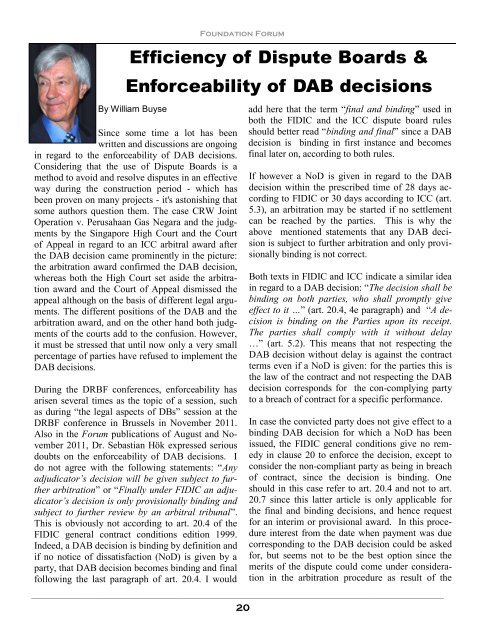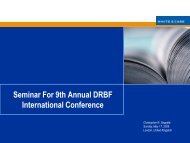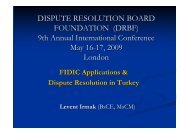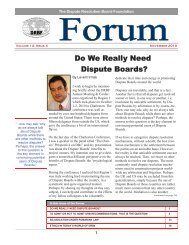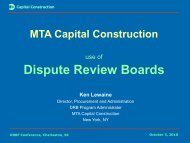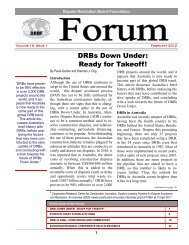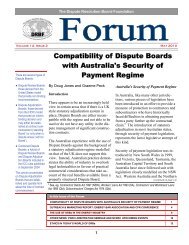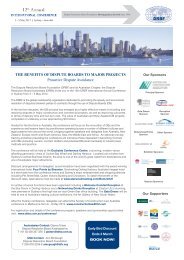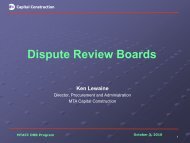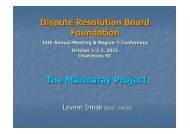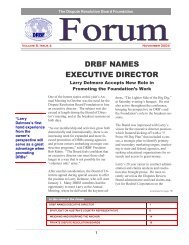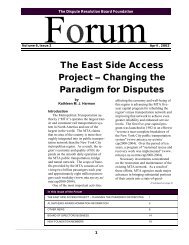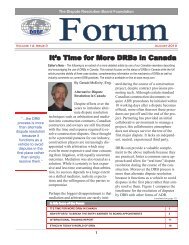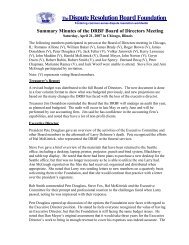Dispute Boards: East vs. West - Dispute Resolution Board Foundation
Dispute Boards: East vs. West - Dispute Resolution Board Foundation
Dispute Boards: East vs. West - Dispute Resolution Board Foundation
Create successful ePaper yourself
Turn your PDF publications into a flip-book with our unique Google optimized e-Paper software.
<strong>Foundation</strong> Forum<br />
Efficiency of <strong>Dispute</strong> <strong><strong>Board</strong>s</strong> &<br />
Enforceability of DAB decisions<br />
By William Buyse<br />
Since some time a lot has been<br />
written and discussions are ongoing<br />
in regard to the enforceability of DAB decisions.<br />
Considering that the use of <strong>Dispute</strong> <strong><strong>Board</strong>s</strong> is a<br />
method to avoid and resolve disputes in an effective<br />
way during the construction period - which has<br />
been proven on many projects - it's astonishing that<br />
some authors question them. The case CRW Joint<br />
Operation v. Perusahaan Gas Negara and the judgments<br />
by the Singapore High Court and the Court<br />
of Appeal in regard to an ICC arbitral award after<br />
the DAB decision came prominently in the picture:<br />
the arbitration award confirmed the DAB decision,<br />
whereas both the High Court set aside the arbitration<br />
award and the Court of Appeal dismissed the<br />
appeal although on the basis of different legal arguments.<br />
The different positions of the DAB and the<br />
arbitration award, and on the other hand both judgments<br />
of the courts add to the confusion. However,<br />
it must be stressed that until now only a very small<br />
percentage of parties have refused to implement the<br />
DAB decisions.<br />
During the DRBF conferences, enforceability has<br />
arisen several times as the topic of a session, such<br />
as during “the legal aspects of DBs” session at the<br />
DRBF conference in Brussels in November 2011.<br />
Also in the Forum publications of August and November<br />
2011, Dr. Sebastian Hök expressed serious<br />
doubts on the enforceability of DAB decisions. I<br />
do not agree with the following statements: “Any<br />
adjudicator’s decision will be given subject to further<br />
arbitration” or “Finally under FIDIC an adjudicator’s<br />
decision is only provisionally binding and<br />
subject to further review by an arbitral tribunal”.<br />
This is obviously not according to art. 20.4 of the<br />
FIDIC general contract conditions edition 1999.<br />
Indeed, a DAB decision is binding by definition and<br />
if no notice of dissatisfaction (NoD) is given by a<br />
party, that DAB decision becomes binding and final<br />
following the last paragraph of art. 20.4. I would<br />
add here that the term “final and binding” used in<br />
both the FIDIC and the ICC dispute board rules<br />
should better read “binding and final” since a DAB<br />
decision is binding in first instance and becomes<br />
final later on, according to both rules.<br />
If however a NoD is given in regard to the DAB<br />
decision within the prescribed time of 28 days according<br />
to FIDIC or 30 days according to ICC (art.<br />
5.3), an arbitration may be started if no settlement<br />
can be reached by the parties. This is why the<br />
above mentioned statements that any DAB decision<br />
is subject to further arbitration and only provisionally<br />
binding is not correct.<br />
Both texts in FIDIC and ICC indicate a similar idea<br />
in regard to a DAB decision: “The decision shall be<br />
binding on both parties, who shall promptly give<br />
effect to it …” (art. 20.4, 4e paragraph) and “A decision<br />
is binding on the Parties upon its receipt.<br />
The parties shall comply with it without delay<br />
…” (art. 5.2). This means that not respecting the<br />
DAB decision without delay is against the contract<br />
terms even if a NoD is given: for the parties this is<br />
the law of the contract and not respecting the DAB<br />
decision corresponds for the con-complying party<br />
to a breach of contract for a specific performance.<br />
In case the convicted party does not give effect to a<br />
binding DAB decision for which a NoD has been<br />
issued, the FIDIC general conditions give no remedy<br />
in clause 20 to enforce the decision, except to<br />
consider the non-compliant party as being in breach<br />
of contract, since the decision is binding. One<br />
should in this case refer to art. 20.4 and not to art.<br />
20.7 since this latter article is only applicable for<br />
the final and binding decisions, and hence request<br />
for an interim or provisional award. In this procedure<br />
interest from the date when payment was due<br />
corresponding to the DAB decision could be asked<br />
for, but seems not to be the best option since the<br />
merits of the dispute could come under consideration<br />
in the arbitration procedure as result of the<br />
———————————————————————————————————————————————————<br />
20


